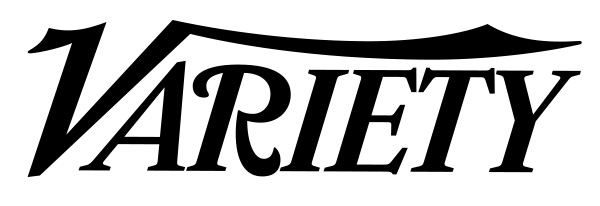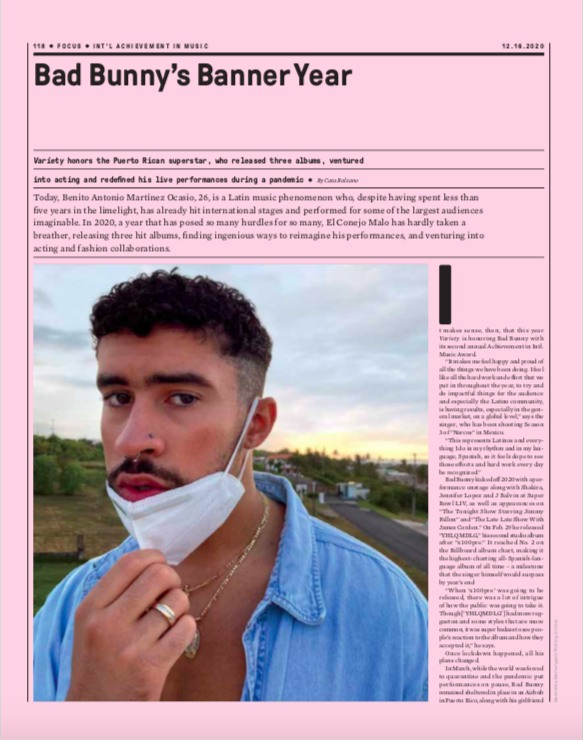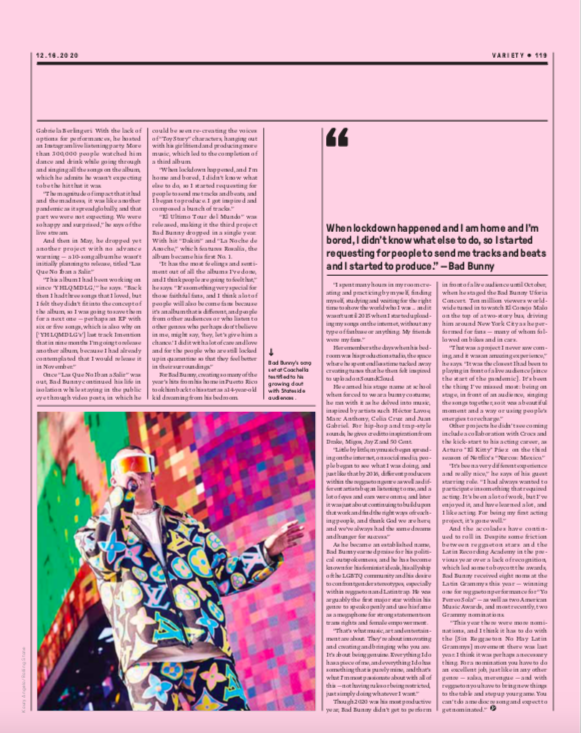Bad Bunny began writing music when he was 14 years old. Today, Benito Antonio Martínez Ocasio, 26, is a Latin music phenomenon who, despite having spent less than five years in the limelight, has already hit international stages and performed for some of the largest audiences imaginable. In 2020, a year that has posed so many hurdles for so many, El Conejo Malo has hardly taken a breather, releasing three hit albums, finding ingenious ways to reimagine his performances, and venturing into acting and fashion collaborations.
It makes sense, then, that this year Variety is honoring Bad Bunny with its second annual Achievement in Intl. Music Award. “It makes me feel happy and proud of all the things we have been doing. I feel like all the hard work and effort that we put in throughout the year, to try and do impactful things for the audience and especially the Latino community, is having results, especially in the general market, on a global level,” says the singer, who has been shooting Season 3 of “Narcos” in Mexico. “This represents Latinos and everything I do in my rhythm and in my language, Spanish, so it feels dope to see those efforts and hard work every day be recognized.”
Bad Bunny kicked off 2020 with a performance onstage along with Shakira, Jennifer Lopez and J Balvin at Super Bowl LIV, as well as appearances on “The Tonight Show Starring Jimmy Fallon” and “The Late Late Show With James Corden.” On Feb. 29 he released “YHLQMDLG,” his second studio album after “x100pre.” It reached No. 2 on the Billboard album chart, making it the highest-charting all-Spanish-language album of all time — a milestone that the singer himself would surpass by year’s end.
“When ‘x100pre’ was about to be released, there was a lot of intrigue about how the public was going to take it. Though [‘YHLQMDLG’] had more reggaeton and some styles that are more common, it was super badass to see people’s reaction to the album and how they accepted it,” he says.
Once the COVID-19 lockdown happened, all his plans changed.
In March, while the world was forced to quarantine and the pandemic put performances on pause, Bad Bunny remained sheltered in place in an Airbnb in Puerto Rico, along with his girlfriend Gabriela Berlingeri. With the lack of options for performances, he hosted an Instagram live listening party. More than 300,000 people watched him dance and drink while singing all the songs on the album, which he admits he wasn’t expecting to be the hit that it was.
“The magnitude of impact that it had and the madness, it was like another pandemic as it spread globally, and that part we were not expecting. We were so happy and surprised,” he says of the live stream.
And then in May, he dropped yet another project with no advance warning — a 10-song album he wasn’t initially planning to release, titled “Las Que No Iban a Salir.” “This album I had been working on since ‘YHLQMDLG,’” he says. “Back then I had three songs that I loved, but I felt they didn’t fit into the concept of the album, so I was going to save them for a next one — perhaps an EP with six or five songs, which is also why on [‘YHLQMDLG’s’] last track I mention that in nine months I’m going to release another album, because I had already contemplated that I would release it in November.”
Once “Las Que No Iban a Salir” was out, Bad Bunny continued his life in isolation while staying in the public eye through video posts, in which he could be seen re-creating the voices of “Toy Story” characters, hanging out with his girlfriend and producing more music, which led to the completion of a third album.
“When lockdown happened, and I’m home and bored, I didn’t know what else to do, so I started requesting for people to send me tracks and beats, and I began to produce. I got inspired and composed a bunch of tracks.” “El Ultimo Tour del Mundo” was released late last month, making it the third project Bad Bunny dropped in a single year. With hit “Dakiti” and “La Noche de Anoche,” which features Rosalía, the album became his first No. 1.
“It has the most feelings and sentiment out of all the albums I’ve done, and I think people are going to feel that,” he says. “It’s something very special for those faithful fans, and I think a lot of people will also become fans because it’s an album that is different, and people from other audiences or who listen to other genres who perhaps don’t believe in me, might say, ‘hey, let’s give him a chance.’ I did it with a lot of care and love and for the people who are still locked up in quarantine so that they feel better in their surroundings.”
For Bad Bunny, creating so many of the year’s hits from his home in Puerto Rico took him back to his start as a 14-year-old kid dreaming from his bedroom. “I spent many hours in my room creating and practicing by myself, finding myself, studying and waiting for the right time to show the world who I was…and it wasn’t until 2015 when I started uploading my songs on the internet, without any type of fanbase or anything. My friends were my fans.”
He earned his stage name at school when forced to wear a bunny costume; he ran with it as he delved into music, inspired by artists such Héctor Lavoe, Marc Anthony, Celia Cruz and Juan Gabriel. For hip-hop and trap-style sounds, he gives credit to inspiration from Drake, Migos, Jay Z and 50 Cent.
“Little by little, my music began spreading on the internet, on social media, people began to see what I was doing, and just like that by 2016, different producers within the reggaeton genre as well as different artists began listening to me, and a lot of eyes and ears were on me, and later it was just about continuing to build upon that work and find the right ways of reaching people, and thank God we are here, and we’ve always had the same dreams and hunger for success.”
As he became an established name, Bad Bunny earned praise for his political outspokenness, and he has become known for his feminist ideals, his allyship with the LGBTQ community and his willingness to confront gender stereotypes, especially within reggaeton and Latin trap. He was arguably the first major star within his genre to speak openly and use his fame as a megaphone for strong statements on trans rights and female empowerment.
“That’s what music, art and entertainment are about. They’re about innovating and creating and bringing who you are. It’s about being genuine. Everything I do has a piece of me, and everything I do has something that is purely mine, and that’s what I’m most passionate about with all of this — not having rules or being restricted, just simply doing whatever I want.”
Though 2020 was his most productive year, Bad Bunny didn’t get to perform in front of a live audience until October, when he staged the Bad Bunny Uforia Concert. Ten million viewers worldwide tuned in to watch El Conejo Malo on the top of a two-story bus, driving around New York City performing as many of his fans followed on bikes and in cars.
“That was a project I never saw coming,” he says. “It was the closest I had been to playing in front of a live audience [since the start of the pandemic]. It’s been the thing I’ve missed most: being on stage, in front of an audience, singing the songs together, so it was a beautiful moment and a way or using people’s energies to recharge.”
Other projects he didn’t see coming include a collaboration with Crocs and the kick-start to his acting career, as Arturo “El Kitty” Páez on the third season of Netflix’s “Narcos: Mexico.” “It’s been a very different experience,” he says of his guest starring role. “It’s been a lot of work, but I’ve enjoyed it, and have learned a lot, and I like acting. For being my first acting project, it’s gone well.”
And the accolades have continued to roll in. Despite some friction between reggaeton stars and the Latin Recording Academy in the previous year over a lack of recognition, which led some to boycott the awards, Bad Bunny received eight noms at the Latin Grammys this year — winning one for reggaeton performance for “Yo Perreo Sola” — as well as two American Music Awards and most recently, twoGrammy nominations.
“This year there were more nominations, and I think it has to do with the [Sin Reggaeton No Hay Latin Grammys] movement there was last year. I think it was perhaps a necessary thing. For a nomination you have to do an excellent job, just like in any other genre — salsa, merengue — and with reggaeton you have to bring new things to the table and step up your game. You can’t do a mediocre song and expect to get nominated.”
See more of my work for Variety here







